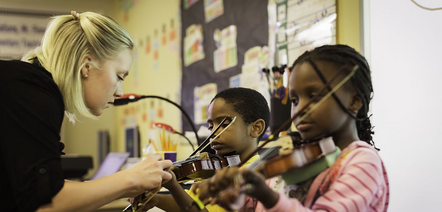New York, NY (Top40 Charts) Music is an art form that makes use of expressions, emotions, and synchronization to create an entertaining piece, such as a song. Several people enjoy various genres of music irrespective of whether they are singing, listening to a song, playing an instrument, or a combination of these three aspects of music. When a person listens to music, it is usually to control his/ her mood, which helps dissipate stress levels. For instance, you can pass the time when caught in traffic by listening to some of your favorite tunes.
Besides, in several cultures worldwide, music has been used to pass down cultural beliefs, knowledge, traditions, etc. from one generation to the next. Music was an essential aspect of the distribution of knowledge well before the introduction of modern languages. As such, today, music has evolved; so much that it can help improve both your mental and emotional health. Nonetheless, despite the diversity of music in most societies today, a good number of learning institutions have reduced the number of music education programs they offer. This is because of diverting most of their resources to other courses.
In my opinion, music should not be overlooked in our learning institutions mainly because we would deny future generations the opportunity of learning such an enjoyable subject as well as depriving students of the chance to improve on their education. Research has shown that music can enhance social interaction, mental development, and relieve stress. Thus, if we allow the elimination of music from the curriculum, these and many more benefits would be lost.
14 Reasons Why Schools Should Support Music in The Learning Process
As previously mentioned, music plays a significant role in the academic development of most students. This article aims to put across the benefits of listening to music. Here are a few reasons why music is beneficial for your academic development. They include:
You gain a sense of accomplishment
Training to play music on a complex instrument is often a challenging but achievable task. In the long run, students who successfully master playing an instrument have a sense of accomplishment. This newly found self-confidence is translated to other aspects of learning; thus, reducing the chances of asking for the help of an essay writer.
You can relieve stress by playing relaxing music
After spending most of your days in school, it is relaxing to get home and listen to some music as it has proven therapeutic effects that help alleviate stress.
Better academic coordination
Learning to play an instrument improves your hand-eye coordination and develop other essential motor skills similar to playing sports.
Improves a student's auditory skills
Training for music helps students develop the ability to attach meaning to the various sounds around them and easily discern their purpose.
Music education helps in the development of both language and reasoning capacity in students
Listening to music is likely to improve your mental ability by developing areas of your brain that are linked to reasoning and language processing much faster.
It enhances the need for collaboration and teamwork
Music helps unite people with diverse cultures, religious beliefs, race, etc. with a common goal effectively promoting productive cooperation among students.
Music helps improve your memory
Having some soft music playing while studying has been shown to increase a student's ability to take in and retain more information in their memory for an extended period.
Music can be utilized to improve the quality of your work
Learning music encourages the development of innovation and creativity among students, which enhances their desire to deliver quality results in all aspects of their education.
Helps improve students emotional and cultural development
Music helps students become more empathetic to diverse cultures and become more social as it a common point of interest for various people in a society.
Improved grades
Research has shown that children who study listening to music are more likely to score better grades.
Learning music can help instill discipline
The long hours of practice and dedication involved in learning how to play a musical instrument are enough to teach the benefits of perseverance and discipline in any student.
Also, performing music in front of others can help you overcome your fears as wells as boost your self-esteem. Therefore, it's evident that music plays a significant role in the mental, physical, and academic development of students. Having read about the benefits music has to offer, learning institutions worldwide should find ways of integrating it into the current learning platforms for students to take advantage of its benefits.
























